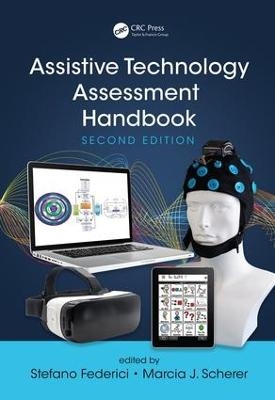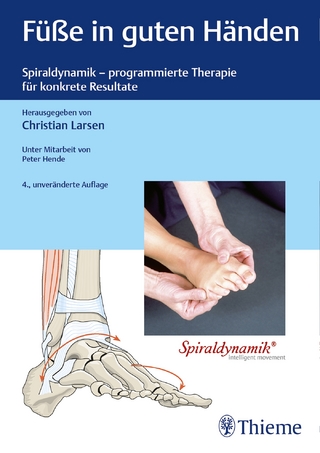
Assistive Technology Assessment Handbook
Crc Press Inc (Verlag)
978-1-4987-7411-6 (ISBN)
Assistive Technology Assessment Handbook, Second Edition, proposes an international ideal model for the assistive technology assessment process, outlining how this model can be applied in practice to re-conceptualize the phases of an assistive technology delivery system according to the biopsychosocial model of disability. The model provides reference guidelines for evidence-based practice, guiding both public and private centers that wish to compare, evaluate, and improve their ability to match a person with the correct technology model. This second edition also offers a contribution to the Global Cooperation on Assistive Technology (GATE) initiative, whose activities are strongly focused on the assistive products service delivery model. Organized into three parts, the handbook: gives readers a toolkit for performing assessments; describes the roles of the assessment team members, among them the new profession of psychotechnologist; and reviews technologies for rehabilitation and independent living, including brain–computer interfaces, exoskeletons, and technologies for music therapy. Edited by Stefano Federici and Marcia J. Scherer, this cross-cultural handbook includes contributions from leading experts across five continents, offering a framework for future practice and research.
Stefano Federici is a professor in general psychology and psychology of disability at the University of Perugia, Italy. He has been a very active researcher in assistive technology for the disabled over the past 15 years and has published extensively in this area. In addition to the first edition, he has also published several additional reference works in the field. Marcia Scherer is a rehabilitation psychologist and founding President of the Institute for Matching Person & Technology She is also Professor of Physical Medicine and Rehabilitation, University of Rochester Medical Center where she received both her Ph.D. and MPH degrees. She is a past member of the National Advisory Board on Medical Rehabilitation Research, National Institutes of Health, and is Editor of the journal Disability and Rehabilitation: Assistive Technology. Dr. Scherer is Fellow of the American Psychological Association, American Congress of Rehabilitation Medicine, and the Rehabilitation Engineering and Assistive Technology Society of North America (RESNA). Dr. Scherer has authored, edited, or co-edited nine books and has published over seventy-five articles in peer-reviewed journals as well as thirty book chapters on disability and technology. Her research has been cited more than 4500 times by others.
Foreward; Preface to First Edition; Preface to Second Edition; Acknowledgements; Editors; Contributors; Section I The Assistive Technology Assessment Process Model and Basic Definitions; Chapter One: Assessing Individual Functioning and Disability; Chapter Two: Measuring Individual Functioning; Chapter Three: Measuring the Assistive Technology MATCH; Chapter Four: Assessment of the Environments of AT Use: Accessibility, Universal Design, and Sustainability; Chapter Five: Measuring the Impact of Assistive Technology on Family Caregivers; Section II Assessment Professionals: Working on the Multidisciplinary Team; Chapter Six: Assessment of Assistive Technology for Individuals with Cognitive Impairments; Chapter Seven: The Special Educator; Chapter Eight: The Psychologist; Chapter Nine: The Psychotechnologist: A New Profession in the Assistive Technology Assessment; Chapter Ten: The Occupational Therapist: Enabling Activities and Participation Using Assistive Technology; Chapter Eleven: Pediatric Specialists in Assistive Solutions; Chapter Twelve: The Geriatrician; Chapter Thirteen: Role of Speech–Language Pathologists in Assistive Technology Assessments; Section III Assistive Technology Devices; Chapter Fourteen: The Systemic User Experience Assessment; Chapter Fifteen: Gesture, Signing, and Tracking; Chapter Sixteen: Using Brain–Computer Interfaces for Motor Rehabilitation; Chapter Seventeen: Graphic User Interfaces for Communication; Chapter Eighteen: Exoskeleton: The New Horizon of Robotic Assistance for Human Gait; Chapter Nineteen: Assistive Technologies for Children with Autism Spectrum Disorder; Chapter Twenty: Technology Developments in Music Therapy; Index
| Erscheinungsdatum | 06.11.2017 |
|---|---|
| Reihe/Serie | Rehabilitation Science in Practice Series |
| Zusatzinfo | 30 Illustrations, color; 79 Illustrations, black and white |
| Verlagsort | Bosa Roca |
| Sprache | englisch |
| Maße | 178 x 254 mm |
| Gewicht | 1250 g |
| Themenwelt | Schulbuch / Wörterbuch |
| Medizin / Pharmazie ► Allgemeines / Lexika | |
| Medizin / Pharmazie ► Pflege | |
| Medizin / Pharmazie ► Physiotherapie / Ergotherapie ► Orthopädie | |
| Medizin / Pharmazie ► Physiotherapie / Ergotherapie ► Rehabilitation | |
| Naturwissenschaften ► Biologie | |
| Recht / Steuern ► Allgemeines / Lexika | |
| Recht / Steuern ► EU / Internationales Recht | |
| Recht / Steuern ► Privatrecht / Bürgerliches Recht ► Medizinrecht | |
| Technik ► Medizintechnik | |
| ISBN-10 | 1-4987-7411-3 / 1498774113 |
| ISBN-13 | 978-1-4987-7411-6 / 9781498774116 |
| Zustand | Neuware |
| Informationen gemäß Produktsicherheitsverordnung (GPSR) | |
| Haben Sie eine Frage zum Produkt? |
aus dem Bereich


